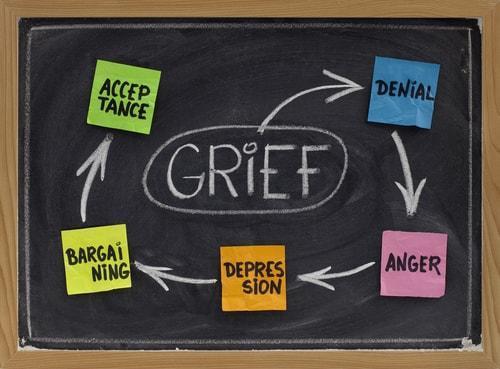Estate Planning and the Five Stages of Grief
 Most people are familiar with the concept of different “stages of grief.” While you may not necessarily be able to list the five stages as they were introduced in 1969, you are most likely aware that grieving, for most people, is a process with fairly distinct elements. While there are other situations that could cause a person to go through the grieving process-such as a divorce or giving a child up for adoption-the most common is during the period following the death of a loved one. When you die, your children, grandchildren, and other family members will almost certainly experience a great deal of grief, which makes responsible estate planning all the more important.
Most people are familiar with the concept of different “stages of grief.” While you may not necessarily be able to list the five stages as they were introduced in 1969, you are most likely aware that grieving, for most people, is a process with fairly distinct elements. While there are other situations that could cause a person to go through the grieving process-such as a divorce or giving a child up for adoption-the most common is during the period following the death of a loved one. When you die, your children, grandchildren, and other family members will almost certainly experience a great deal of grief, which makes responsible estate planning all the more important.
What Are the Five Stages?
In 1969, a Swiss-American psychiatrist named Elisabeth Kubler-Ross published a book called "On Death and Dying" which introduced the stages of grief as she saw them. Based on her experience and study, she identified the five stages as Denial, Anger, Bargaining, Depression, and Acceptance. Despite being laid out as linear-suggesting that one stage leads into the next-the reality is much more complicated. A person who is largely in the Anger stage of grief is likely to experience moments or days of Denial and Depression. He or she may even skip a stage and effectively come back to it at a later point.
There is no right or wrong way to grieve. The model simply helps people understand that their range of emotions are completely normal and provides a measure of hope that the challenges of grief will not last forever.
Side Effects of Grief
It is not unusual for a grieving person to experience physiological effects in addition to his or her roller coaster ride of emotions. Some of the physical effects can be severe. A grieving person may experience fatigue and malaise, problems sleeping, heart palpitations, shortness of breath, nausea, hair loss, hypertension, loss of appetite, and even visual and auditory hallucinations. Grief can also cause flare-ups of existing conditions such as asthma, eczema, and arthritis.
How Estate Planning Helps
When a person is dealing with grief in any of the five stages, he or she may not be in the best position to make important decisions-or even relatively inconsequential ones. The added pressure can be emotionally and psychologically devastating. Because there is no way to know for sure how grief will affect a person until the time comes, your best bet is to remove as much of the decision-making as possible. You can do this for your loved ones by drafting and executing a comprehensive estate plan that clearly lays out your intentions for your assets and property, along with many other important considerations. Your estate plan can even include pre-made arrangements regarding your funeral and similar concerns. By limiting the decisions that need to be made following your death, your loved ones will have the freedom grieve in a manner that suits each person while not having to worry about what will happen to your estate.
To begin the estate planning process or for help with updating an existing plan, contact an experienced Lombard estate planning attorney. Call 630-426-0196 for a confidential consultation with A. Traub & Associates today.
Sources:
https://funeralresources.com/grief-and-loss/five-stages-of-grief/
http://primeontheweb.com/finance/howgriefaffectsest/












